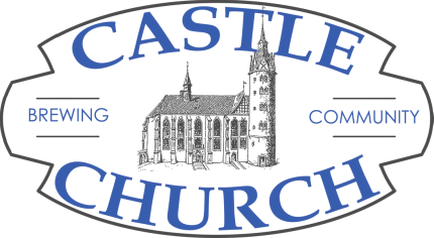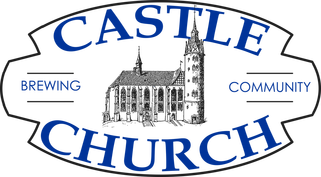|
Jared Witt l 500 Year Anniversary of Reformation Day, October 31, 2017 We’re sorry. The position of Savior has already been filled. Others need not apply. Today, we Lutherans celebrate 500 years of nailing this memo to church doors, and library doors, and municipal doors…pretty much any door we can find, because it just never stops being relevant. If you’re not sure why it’s still relevant, I invite you to scan your Twitterfeed or favorite news app. Greasy demagogues and be-robed religious nuts are forever getting up on their pedestals and setting themselves up as the new Christs, telling you that you need to join their institution, jump through their hoops, or vote for their ticket for your salvation. And we Lutherans keep knocking them down. That’s our role in this world, I guess. We knock down false messiahs. Jared Witt l September 14, 2017 Martin Luther had this phrase that would’ve unnerved a lot of stuffy church folk if he had uttered it yesterday, let alone in the 16th century, when he sparked the movement that would become all of western Protestantism. “Faith creates the deity.” He wasn’t trying to be heretical. He was just trying to take seriously what the Bible says about gods and our relationship to them. From Genesis forward, God, the creator, goes by many regional names and qualitative descriptions in the Hebrew scriptures. El Elyon (“God Most High”), Adonai (“Lord”), Elohim (“God of gods”), and El Shaddai (“the many breasted one”) are among the most popular. Then, as of Exodus, the mysterious YHWH, the unpronounceable anti-name given to Moses at the burning bush, begins to push those other identifiers to the side. By design, we don't really know anything about this unnameable name other than that it's associated with One who has a particular concern for the poor and the marginalized. As we move into the proto-Trinitarian thinking of the Christian Testament, Jesus becomes the face of God the Father (note that "father" is a metaphor, not an identifier) by the power of the Holy Spirit, but just like YHWH, that also seems to be a paradoxical refusal give us an easy handle on the divine. So, biblically, “God” is not a proper noun, despite how comfortable we get using the term that way. If the creator of the universe had a birth certificate, it would not read: Name - God Birthdate - 01/01/00 Birthplace - The Center Parents - Judith and Reginald van Nihilo Jared Witt l March 24, 2017 So I guess Lent is all the rage now (at least in my circles). Honestly, I get why some people make fun of us church nerds. Our claim is this: a man got the death penalty one day, and his expiration somehow matters twenty centuries later to a CPA named Ernie in West Virginia. And, oh, by the way, we reenact a 40 day journey toward this event every year all over the world. To be clear, it would not be readily obvious to anyone standing on the hill outside Jerusalem that day why this man’s death should matter to Ernie. But Christians have grown so accustomed to the idea that it does, we treat it like it’s the most obvious thing in the world. So I want to write about one very unhelpful way of getting from Jesus to Ernie, which many Christians treat like it’s as matter-of-fact as gravity, and then suggest a more helpful way. Jared Witt l March 9, 2017 I am no saint. And I am not just a sinner. I am loved like a saint and at the same time have an almost religious devotion to selfishness and self-harm. So does God forgive me or not? A lot of people try to start with the Bible when they answer that question--never a bad place to start. The only problem is, allow me to save you some time with this if you didn't know already, scripture goes back and forth all the time on this question. So the only way to get a satisfying answer is to take the answers you like and to lie to yourself about what the rest of it says. This doesn’t mean that scripture isn’t your most precious resource when answering this question of urgent importance. It just means that the Bible is a book which argues against itself all the time. This isn’t some flaw that needs to be covered up in the historical records. It’s perfectly intentional. Scripture should be read argumentatively because it is, itself, a history of argument. To read it slavishly and unthinkingly is to either be very confused or to lie. Jared Witt l February 9, 2017 I recently went to see a counselor—surprising, I know, given my cheerful disposition—and there was a question on the patient information sheet asking about my religion. I don’t purposely try to be a smartass with stuff like that. Well, ok, I once told a dentist that maybe my molar no. 2 was sensitive to hot or cold because of his relationship with his father. So let us say that at least 60 percent of the time I try not to be a smartass with stuff like that. But if I'm to be totally honest, it has started to feel even more disingenuous to say that I'm a “Christian” with no other qualifiers. So I settled on “Christian – mostly.” Counselor: What’s with the 'mostly'? Me: It’s complicated. Jared Witt l August 18, 2016 My wife, Nikki, is absolutely in love with people. And I don’t just mean that she loves the people who feel most familiar and comfortable to her. We all love those people. My wife loves strange people, foreign people, difficult people specifically because they are strange, foreign, or difficult. I first started noticing this about her while we were still in school, dating and barista-ing together at Starbucks (kind of a big no no except that everyone in the history of baristas has done it). The café where we worked is in an uncharacteristically diverse pocket of Columbus, Ohio, which has one of the highest Jewish population densities in the US and people from several different central African cultures. Watching her interact with the neighborhood, while I spilled cappuccino on the floor, was where I first learned that my wife was going to become my wife. I’d watch her face soften into pure, self-forgetful tenderness when our Eritrean and Ethiopian customers would come in and make an order through broken English. I’d watch her become as patient as a mother to one of our regulars, who was mentally ill, and several others who were just plain mean. Her short, tight crop of brown curly hair created more than a couple conversation in-roads with the African American women (I’m not sure if the term “white girl afro” is politically correct, but you get the idea). If you were well-traveled, she would ask you about it with the fascination of a two year old but would take equal interest in your story if you’d never even been out of the state. Have you ever wondered what beer from the Middle Ages might have tasted like? If you thought that wheat, hops, yeast esters, and barrel aging were modern craft beer trappings, you may be surprised to know that over 500 years ago the region of Einbeck, Germany was successfully producing a style of beer with a profile that could rival that of the best craft breweries today. My good friend, Justin Stone, who teaches philosophy at Valencia college, has a really profound way of saying it: “I try to own a few really nice things.” Now, here is the context in which I find that so profound. My wife, Nikki, and I are trying to be more intentional and faithful about how we use our money. As three steps forward, two steps back followers of the Way of Jesus, we’re trying to live up to these core commitments:
Sounds simple enough even as I write it out like that. But I find that it was so much easier to be an idealist about how we walk this walk back in seminary and college, when we had no spending money beyond what paid the bills and kept us in Ramen. It was so much easier to be a moral absolutist back then. I remember somewhat obnoxiously pronouncing to my friends in college that I was a minimalist. I might have even told them that they had license to shoot me, if I ever ended up spending my weekends at Lowe’s, buying tools that I don’t want in order to fix up more house than what I need. Well…guess where I sit right now, as I’m writing this, and guess where I spent last weekend. It’s not that we’ve totally compromised our ideals about money. But, at some point, we were faced with a choice between renting our money into a bottomless pit, month after month, or seeing a small (surprisingly small!) part of it become that percentage of the house which we actually own (two closets and half the garage, at time of writing). At some point, we were faced with a choice between buying a frame for the guest bed, or letting guests sleep on the floor. At some point we were faced with a choice between actually fixing the leak in the roof or having a Red Alert Class 4 mold storm in our attic. None of these contingencies are mentioned when Jesus tells the rich young man, “Go, sell what you own, and give the money to the poor” (Mark 10:21). I don’t want to make it sound like we’re just at the mercy of these life transitions, and we’ve had no say in the matter. And I kind of want to punch myself for writing such a WASP-y sounding blog. But I’m trying to tell the truth about my life right now—or as we say it in the Castle Church Faith Community, I’m confessing. So there you have it, college me. I said it. I’m a sellout. Given that I’m a sellout, the question then becomes, Is being a sellout an all or nothing deal? Do our things just own us now, if we can’t fully divest ourselves of them? Or can we partly sellout and partly be devoted to taking the power back in small ways? Do Nikki and I throw our hands up and quit striving for faithfulness, if we know we’ll never get it 100 percent right? In the Lutheran way of seeing the world, the answer is no. Luther was a moral realist. He wasn’t crazy about moral absolutism, because it never seems to make people any better. It just keeps setting an impossibly high bar for them until they give up entirely. Or they just start lying to themselves. For instance, a moral absolutist, who is aware of the global food crisis, says, “Welp, I don’t think I could ever be a full fledged vegan, so I’m just going to eat steak three times a day. In fact, I think the scientists are just making it all up. There is no food crisis.” Or they go the other direction and say, “Welp, I ate some quinoa for dinner last night, so that pretty much solves it.” Both of these avenues are what Lutherans call “self-justification.” So, every week, we start telling the truth about our lives by reminding each other, “If we say we have no sin, we deceive ourselves, and the truth is not in us.” For Lutherans, having confessed this, it becomes possible, in small ways, to fight back against the torrent of compromises that life rushes upon us. If perfectionism is a lie, the pressure to be perfect is a nonissue. So do something, at least. When my friend, Justin says, “I try to own a few really nice things,” it’s profound what he’s not saying. He’s not saying, “a lot of really nice things.” There is a limit to how much we need to indulge ourselves to enjoy God’s good gifts, and surpassing that limit always complicates our lives; it never improves them (my understanding of the “tree of knowledge” story in Genesis). He is also not saying, “a few pieces of junk.” There is a certain thoughtfulness and self-awareness that goes into indulging in those couple of things that actually do bring us a bit of happiness versus just “Supermarket Sweep”-ing the store shelves like some kind of ravenous animal. He is being a Lutheran. He is making a bold and liberating pronouncement that it is possible to strive for a life of faithfulness and intentionality, albeit far short of perfection. We can do this because Lutherans have never believed that Lutherans could save the world. Only God can do that. When we do manage to use our resources in redeeming and life-affirming ways, we’re not saving anyone. But we are saying, “We think God’s plan for the world looks something like this.” What Aaron, myself, and hopefully you all, with us, are trying to create at Castle Church is a space for “a few nice things.” We’ll drink a couple of really quality beers rather than an 18-pack of something cheap. We’ll turn a few TVs on when there is an Orlando City SC match, but we won’t have 37 TVs playing white noise at all hours of the day. We’ll have a few food recipes born of the love and creativity of a real chef, but we won’t serve a 12 page menu of things that we don’t know how to do well. And most importantly, we’ll try to cut out some of the white noise of our lives, so that we can really hear and build community with the person sitting across from us. Grace and peace, Jared |
Mashing in.On how Castle Church is stirring up a movement from a brewery in Florida. Archives
July 2018
|
Curated selection
- UK Online Casinos Not On Gamstop
- UK Online Casinos Not On Gamstop
- Casino Sites Not On Gamstop
- Best Non Gamstop Casinos UK 2025
- Casino Sites Not On Gamstop
- UK Online Casinos Not On Gamstop
- Non Gamstop Casinos UK
- Non Gamstop Casino Sites UK
- UK Casino Not On Gamstop
- Best Non Gamstop Casinos
- Online Casinos
- UK Casino Not On Gamstop
- Non Gamstop Casino
- Gambling Sites Not On Gamstop
- Migliore Casino Non Aams
- List Of UK Casino Sites
- UK Casinos Not On Gamstop
- Gambling Sites Not On Gamstop
- Best Non Gamstop Casinos
- Casino Not On Gamstop
- Betting Sites
- Non Aams Casino
- Migliori Siti Casino Non Aams
- Non Gamstop Casino
- Casino En Ligne
- Bitcoin Casinos
- Meilleur Site Casino En Ligne Belgique
- Meilleur Casino En Ligne Avis
- Site De Paris Sportif Bonus
- Paris Sportif Ufc Mma
- Siti Di Casino Online 2026
- Meilleur Casino En Ligne
- Casino En Ligne
- 50 Free Spin Senza Deposito
- Migliori Casino Online
- Meilleur Casino En Ligne France
- Nuovi Casino Non Aams
- Nouveau Casino En Ligne France
- Migliori Siti Casino Online
- Trusted Online Casino Malaysia

 RSS Feed
RSS Feed




